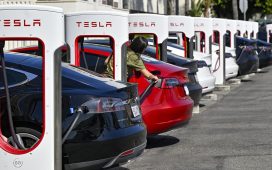The settlement, with 40 states and the District of Columbia, prohibits Ford from making false or misleading advertising claims concerning the estimated fuel economy or payload capacity of a new motor vehicle. Ford did not admit wrongdoing as part of the settlement. Ford did not immediately respond to a request for comment.
Ford misrepresented the distance consumers could drive on one tank of gas, asserted driving style would not influence vehicles’ real-world fuel economy and claimed superior real-world fuel economy compared to other hybrids, Acting New Jersey Attorney General Matthew Platkin said.
Platkin said Ford ran deceptive advertisements called the “Hybrid Games” that were narrated like an Olympic sport that depicted the Ford C-Max outperforming the Toyota Prius in a series of videos.
The states allege that Ford used a deceptive methodology for reclaiming the “Best in Class” payload capacity after other trucks had surpassed Ford.
“In calculating the maximum payload capacity of its vehicles, the investigation found, Ford employed a truck configuration it did not actually intend to sell to individual buyers – one that omitted such standard items as the spare wheel, tire and jack, radio, and center console (which was replaced by a mini-console),” Platkin said.
As a result, “Ford was able to add additional pounds to the maximum advertisable payload capacity of its Super Duty truck — just enough for Ford to reclaim the title of ‘Best-in-Class’ for payload.”








